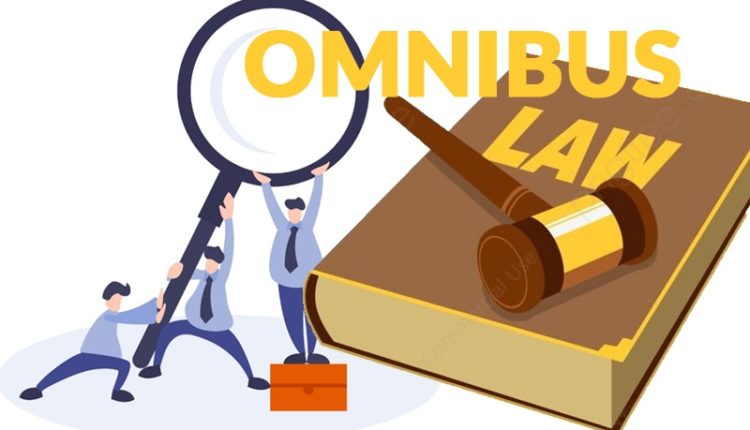Omnibus Law Working Copyright Bring Hope Indonesia Forward
By: Yusak Ceasar )*
In an effort to advance the country’s economy, it is necessary to change regulations which are considered effective. This new breakthrough through the Omnibus Law Bill of Employment Creation is a great hope for moving towards Indonesia.
President Joko Widodo again revealed the government’s reasons behind the formation of the Omnibus Law. According to him, the Omnibus Law is there to cut and simplify various regulations which are considered to be very numerous and actually overlap. This has caused the government to be constrained and limited in space so that decision making is slow and inappropriate.
Omnibus Law is a law (Law) created to resolve major issues by revoking or replacing several laws at once, so that regulation becomes simpler. The preparation of the Omnibus Law has the ultimate goal to encourage national economic growth.
Indonesia is indeed being hit by over-regulation. The Indonesian Center for Law and Policy Studies (PSKH) notes that during the Jokowi administration until November 2019, 10,180 regulations were issued. The details are 8,584 Ministerial Regulations, 839 Presidential Regulations, 526 Government Regulations, and 131 Laws. This data is one of the references in the consideration of the realization of the Omnibus Law which will cut and simplify regulation.
The national economy can be strengthened by Omnibus Law through job creation and taxation facilities. The positive side of the Omnibus Law is to create jobs for the unemployed. Then, the focus of the Omnibus Law is to create jobs for approximately 7 million unemployed people. Omnibus Law is believed to have a positive impact on property development.
There are three things that are aimed at making this Omnibus Law, namely the taxation law, employment creation, and the empowerment of MSMEs. Around 77 laws and approximately 1,229 articles that have been identified are affected by the Employment Copyright Omnibus. This figure can still change, depending on the results of deliberations with the relevant ministries and agencies.
The Association of Indonesian City DPRD (Adeksi) supports the Omnibus Law. The general chairman of Adeksi, Armuji said that of course they want to accelerate investment right into their city without being hampered by convoluted regulations. This is a comment related to the Omnibus Law Working Copyright.
On the other hand, Airlangga Hartanto’s Economy Sector also said that the government has a 75 percent support force in parliament for the ratification of the Omnibus Law Bill.
Then the government lobbied parties outside the government coalition to approve Omnibus Law regulations. The party outside the coalition finally agreed to structural transformation. In principle, they support Omnibus Law. Both taxation and work copyrights, where the work copyright taxation is a package with all the incentives contained in taxation and the structure is in the work copyright.
The Omnibus Law bill is of course highly expected to strengthen the national economic sector both through the improvement of the investment ecosystem and also the competitiveness of the Indonesian state, especially in dealing with uncertainties and slowdowns that occur in the global economy.
When the Omnibus Law was implemented, there were 3 benefits, the first of which was tidying the overlapping regulations. The second benefit, the efficiency of the change process is also the revocation of laws and regulations. Then the last, negating the sectoral ego contained in various laws and regulations.
Omnibus law is indeed very worthy to be supported because it is a great breakthrough for a big step towards Indonesia forward. For this reason, the draft bill certainly also requires the support and participation of the community because it involves a variety of important matters in the life of the nation and the state which can then overcome various regulatory and bureaucratic problems in the country.
)* The author is a citizen, living actively in the Tangerang Public Literacy Forum
